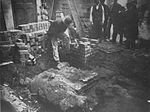Martineau Galleries
Buildings and structures in Birmingham, West MidlandsProposed buildings and structures in the United KingdomShopping centres in the West Midlands (county)Use British English from June 2014Vague or ambiguous time from September 2019
Martineau Galleries is a proposed mixed-use development for Birmingham, England which was shelved in 2009 but re-approved in 2020. It was to connect the Eastside to the city centre core, a major retail area.
Excerpt from the Wikipedia article Martineau Galleries (License: CC BY-SA 3.0, Authors).Martineau Galleries
Dale End, Birmingham Digbeth
Geographical coordinates (GPS) Address Phone number Website Nearby Places Show on map
Geographical coordinates (GPS)
| Latitude | Longitude |
|---|---|
| N 52.481125 ° | E -1.8934833333333 ° |
Address
Ngopi
Dale End 56
B4 7LS Birmingham, Digbeth
England, United Kingdom
Open on Google Maps









